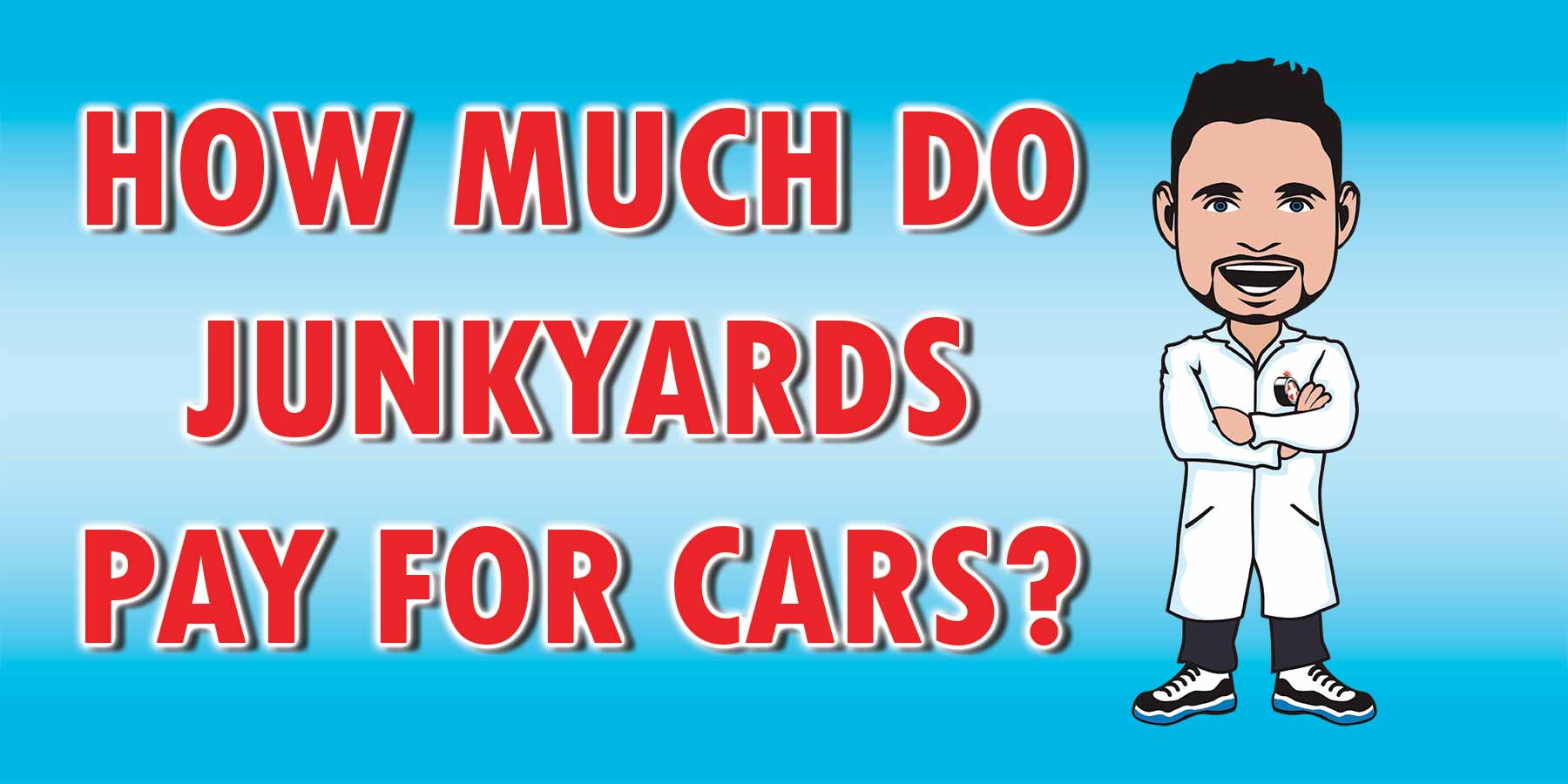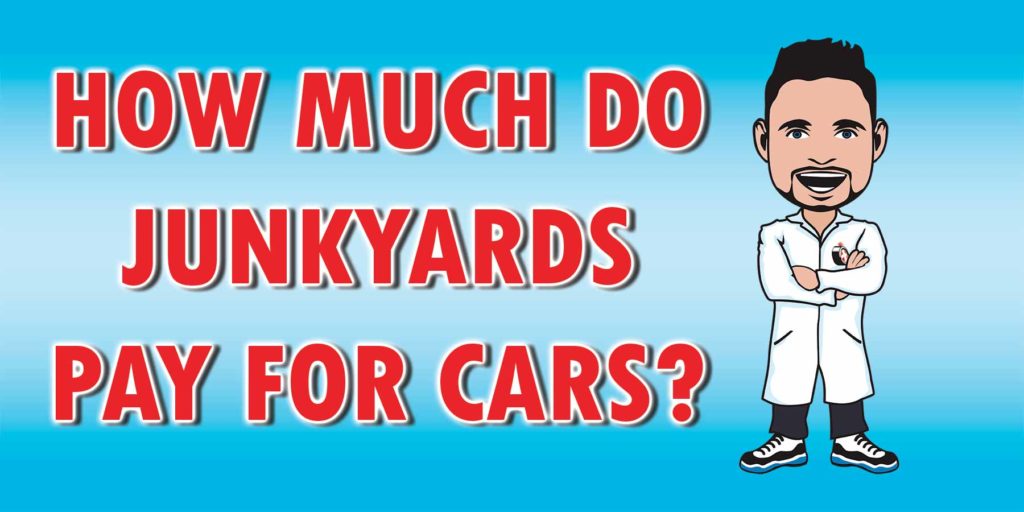Wondering how much junkyards pay for cars? They usually offer between $100 and $500.
Prices depend on factors like the car’s age, condition, and weight. Selling a car to a junkyard can seem confusing. But, understanding the process can help you get the best deal. Junkyards buy cars mainly for parts and scrap metal.
The value they offer depends on several factors. This includes the car’s make, model, year, and overall condition. Junkyards also consider the current scrap metal prices. Knowing these details can help you estimate your car’s worth. In this guide, we’ll break down what affects the price and how to get the best offer for your junk car. Stay tuned to learn more!
Introduction To Junkyards
Have an old car sitting idle? Junkyards might be the solution. Junkyards buy old, damaged, and unwanted cars. They offer a quick way to dispose of vehicles. This blog post explores the world of junkyards.
What Are Junkyards?
Junkyards are also known as salvage yards. They are places where old cars are stored. These cars are often beyond repair. Junkyards dismantle these cars. They sell usable parts and scrap metal.
Junkyards play a vital role. They help recycle car parts. They reduce waste and support the environment. They also offer car parts at lower prices.
Why Sell To Junkyards?
Selling to junkyards has many benefits. It is a fast and easy process. You get rid of unwanted cars without hassle. Here are some reasons:
- Quick Cash: Junkyards pay cash on the spot.
- Free Towing: Many junkyards offer free towing services.
- Eco-Friendly: Junkyards recycle car parts, reducing waste.
- Space Saving: Free up space in your garage or yard.
Junkyards often pay based on the weight of the car. The price of scrap metal influences the payment. The more metal, the more money you get.
Several factors affect the payment:
- Car’s Condition: Working parts increase value.
- Make and Model: Popular models often fetch more.
- Current Scrap Metal Prices: Prices fluctuate based on market demand.
Factors Affecting Car Value
When selling a car to a junkyard, several factors impact its value. Understanding these can help you get the best price for your vehicle. Let’s dive into the key factors that determine how much junkyards pay for cars.
Car Make And Model
The make and model of your car play a big role in its value. Popular brands and models often fetch higher prices. Junkyards need parts that are in demand. If your car is a common model, its parts will likely be needed. Rare or luxury models may also have higher value due to their unique parts.
Condition And Age
The condition of your car is another critical factor. A car in good shape will be worth more. Junkyards assess if the car is running or if its parts are usable. The age of the car also matters. Newer cars usually have more valuable parts. Old cars may still have worth if their parts are in good condition.
Market Demand
Market demand greatly influences car value at junkyards. If many people need parts from your car’s model, its value increases. Seasonal trends can affect demand too. For example, convertibles may be in higher demand in summer. Economic factors also play a role. When the economy is strong, junkyards may pay more.
Assessing Your Car’s Worth
Assessing your car’s worth is crucial before selling it to a junkyard. Understanding the value helps you get a fair price. This process involves gathering essential information and using reliable valuation tools.
Gathering Information
Start by collecting important details about your car. Note the make, model, and year. Check the mileage and condition. Look for any damages or missing parts. These factors impact your car’s value. A well-maintained car fetches more money. A car with many problems might get less. Accurate information leads to a better estimate.
Using Online Valuation Tools
Online tools help you estimate your car’s worth. Websites like Kelley Blue Book offer free valuations. Enter your car’s details and get an estimate. These tools consider market trends and demand. They provide a fair price range. Use multiple tools for a more accurate value. Compare the results to get a clear idea.
Choosing The Right Junkyard
Selling your car to a junkyard can be a good way to make money. But, not all junkyards are the same. Choosing the right one can make a big difference. Here are some tips to help you.
Researching Options
Start by making a list of local junkyards. Search online and note their names. Check if they are licensed. A licensed junkyard follows rules and pays fair prices. You can also ask friends or family for recommendations.
Reading Reviews
Once you have a list, read reviews. Check their ratings on Google or Yelp. Look for comments about their customer service and payment process. Bad reviews can be a red flag. Good reviews can help you trust the junkyard more.
Local Vs. National Junkyards
Consider if you want to deal with a local or national junkyard. Local junkyards might offer better prices. They do not have high overhead costs. National junkyards might be more professional. They often have more resources and better customer service.
Choosing the right junkyard is important. It can affect how much you get paid for your car. Take your time and make a smart choice.
Maximizing Your Offer
When selling your car to a junkyard, you want to get the best offer possible. Maximizing your offer involves several strategies that can significantly increase your payout. This section will focus on key tactics to help you get the most money for your junk car.
Negotiation Tips
Effective negotiation can make a big difference in the amount you receive. Here are some tips to help you negotiate better:
- Do your research: Know the value of your car. Check online for similar models and their prices.
- Get multiple quotes: Contact several junkyards to compare offers. Use the highest offer as leverage.
- Be honest: Provide accurate information about the car’s condition. Honesty builds trust and can lead to a better deal.
- Highlight valuable parts: Mention any parts in good condition. This can increase the offer.
Selling Car Parts Separately
Sometimes, selling parts separately can fetch more money than selling the whole car. Consider these steps:
- Identify valuable parts: Items like the engine, tires, and battery often have good resale value.
- Remove parts carefully: Ensure parts are in good condition. Damage can reduce their value.
- Sell online or locally: Use platforms like eBay or Craigslist. You can also sell to local auto shops.
Here’s a table showing the average value of common car parts:
| Car Part | Average Value |
|---|---|
| Engine | $500 – $1,000 |
| Transmission | $300 – $800 |
| Tires | $50 – $200 each |
| Battery | $20 – $100 |
Maximizing your offer requires effort but can lead to a higher payout. Use these tips to ensure you get the best deal possible.

Credit: eliteheadspa.com
Preparing Your Car For Sale
Selling your car to a junkyard can be a great way to make some extra cash. But before you do, you should prepare your car for sale. Proper preparation can help you get the best price for your vehicle. This involves a few simple steps that can make a big difference.
Removing Personal Items
Before you sell your car, make sure to remove all personal items. Check the glove compartment, trunk, and under the seats. You don’t want to leave behind anything valuable or important.
Here is a quick checklist:
- Check glove compartment
- Look under the seats
- Empty the trunk
- Remove any accessories
Gathering Necessary Documents
To sell your car to a junkyard, you need to have the right documents. These documents prove that you own the car and have the right to sell it.
Here is a list of necessary documents:
| Document | Description |
|---|---|
| Title | Proves ownership of the car |
| Registration | Shows the car is registered |
| Identification | Your driver’s license or ID card |
Having these documents ready can make the sale process smoother and faster.
Understanding Payment Methods
Selling your car to a junkyard can be a quick way to get some cash. But how do junkyards pay for cars? Understanding payment methods can help you choose the best option for you. Let’s explore the common ways junkyards pay for cars.
Cash Payments
Many junkyards offer cash payments for cars. This method is fast and straightforward. You receive money on the spot. Here are some benefits:
- Immediate payment
- No waiting for checks to clear
- No need to share bank details
Cash payments can be ideal if you need money quickly. But there are some downsides. Carrying large amounts of cash can be risky. Ensure you count the money carefully before leaving the junkyard.
Checks And Electronic Transfers
Some junkyards prefer to pay by checks or electronic transfers. These methods are safer for large payments. Here’s a comparison:
| Payment Method | Pros | Cons |
|---|---|---|
| Check |
|
|
| Electronic Transfer |
|
|
Electronic transfers are quick and reduce the risk of carrying cash. But ensure the junkyard is reputable. Always verify payment has been received before finalizing the deal.

Credit: www.junkcarmedics.com
Common Mistakes To Avoid
Selling your car to a junkyard can be tricky. Many people make mistakes that cost them money. Avoiding these mistakes can help you get the best price for your car.
Accepting The First Offer
Many sellers accept the first offer they get. This is a common mistake. Junkyards often offer low prices at first. They hope you will accept without questioning. Always get multiple offers. Compare them before deciding. This helps you get a fair price.
Not Comparing Prices
Another mistake is not comparing prices. Each junkyard values cars differently. Some may offer more based on demand. Others may give lower offers. Spend time calling different junkyards. Ask for quotes. Create a list of offers you receive. Compare these offers to choose the best one.
| Junkyard | Offer |
|---|---|
| Junkyard A | $300 |
| Junkyard B | $450 |
| Junkyard C | $400 |
As the table shows, offers can vary. By comparing, you avoid losing money. Take the time to research and compare. This ensures you get the most money for your car.
Conclusion And Next Steps
Deciding to sell your car to a junkyard can be a smart move. Understanding the steps and considerations involved will help you make the best choice. Here, we will review the process and discuss how to make the final decision.
Reviewing The Process
First, research local junkyards. Check their reviews and compare offers. Contact several junkyards to get quotes. Provide accurate details about your car. Mention the make, model, year, and condition. Some junkyards might ask for photos. This helps them give a precise offer.
Next, prepare your car for sale. Remove personal items and clean it out. Gather all necessary paperwork. This includes the title and registration. If your car is not drivable, arrange towing. Some junkyards offer free towing services.
Making The Final Decision
Compare the offers you received. Consider the convenience of each option. Look at the offered price and additional services like free towing. Think about the reputation of the junkyard. A reliable junkyard ensures a smooth transaction.
After choosing the best offer, finalize the sale. Ensure you have all necessary documents ready. Sign over the title and complete any required paperwork. Arrange for payment and towing if needed. Keep a copy of all transactions for your records.
Selling your car to a junkyard can be straightforward. Follow these steps to ensure you get a fair deal. Review the process carefully and make an informed decision.

Credit: www.junkcarmedics.com
Frequently Asked Questions
How Much Can I Get For My Junk Car?
The amount varies. Factors include the car’s make, model, condition, and scrap metal prices.
What Affects Junk Car Prices The Most?
Key factors are the car’s weight, condition, and demand for its parts.
Do Junkyards Pay More For Certain Car Brands?
Yes, popular brands often fetch higher prices due to high demand for their parts.
Can I Sell A Car Without A Title?
Sometimes. Some junkyards may accept cars without titles, but it’s easier with one.
How Do I Get The Best Price For My Junk Car?
Get multiple quotes, provide accurate information, and remove valuable parts beforehand.
Conclusion
Selling your car to a junkyard can be a smart move. It’s quick and often easy. Consider the condition and type of your vehicle. Different junkyards offer different prices. Always compare offers. This helps you get the best deal. Remember to bring all necessary paperwork.
It speeds up the process. Don’t forget to remove personal items from the car. With a little effort, you can turn that old car into cash. Happy selling!

















